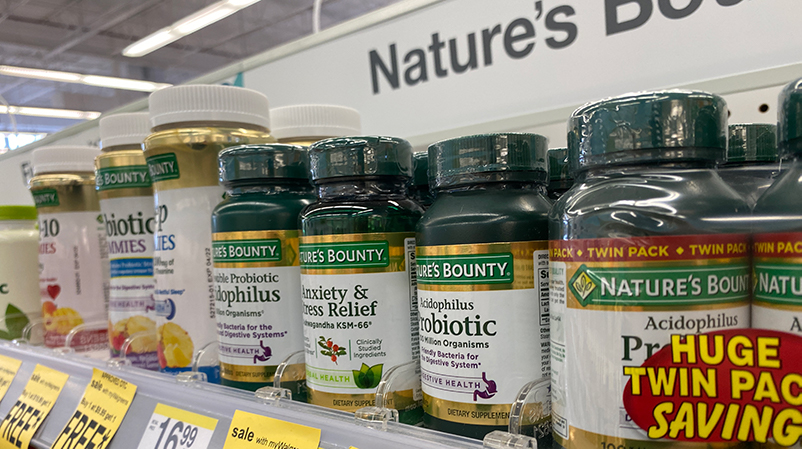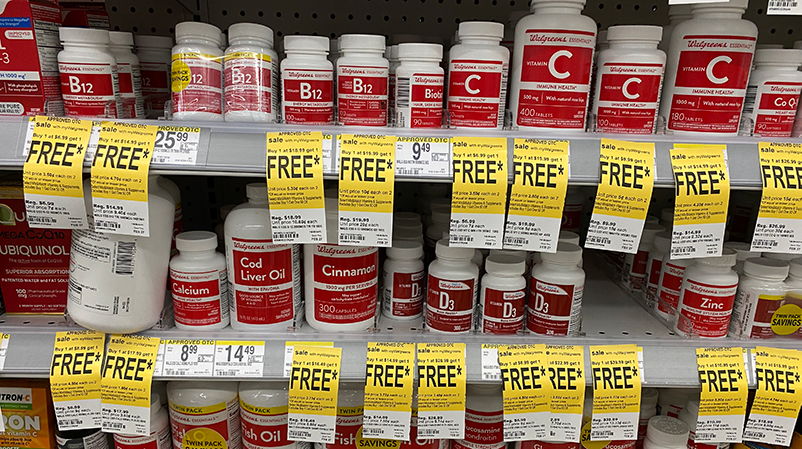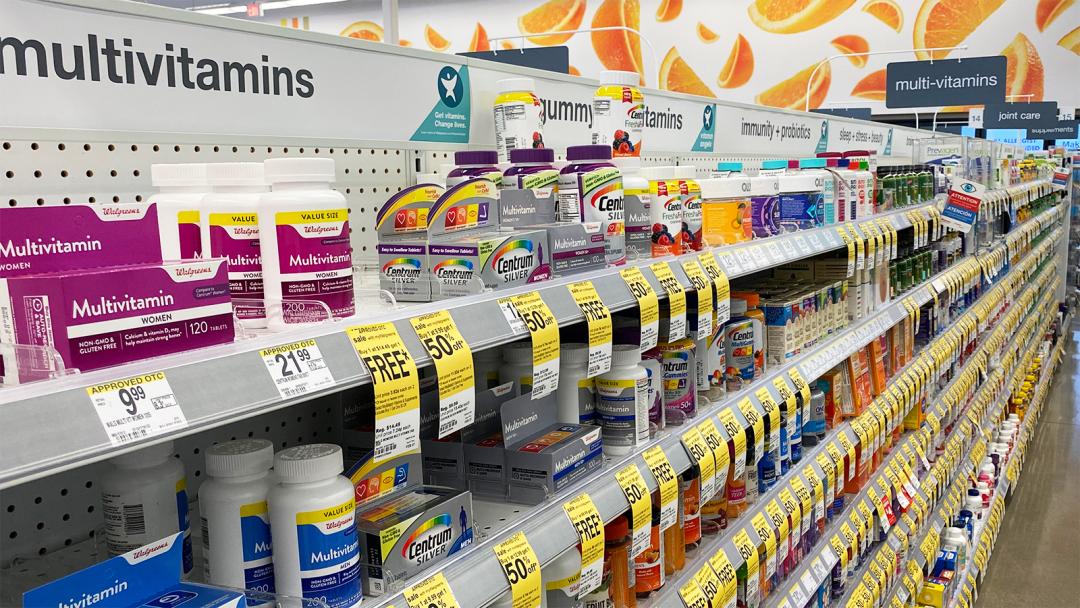One area that saw a particularly large uptick in demand was the vitamin and supplement category. In fact, as early as March 2020, nationwide sales of vitamin C were increasing by almost 150 percent.
 Adele Botan Chimi-Lakbub |
Although items like vitamin C are known to have positive overall health effects when incorporated into a larger health and wellness regimen, they should not be relied on to protect against or treat the symptoms of COVID-19. But how do you know what to take, when or why?
Fortunately, Walgreens pharmacists are here to help.
Adele Botan Chimi-Lakbub, pharmacist in Lenexa, Kan., participated in the training this past winter. She joined Walgreens Stories to answer questions about the effect COVID-19 is having on vitamin and supplement trends at Walgreens, the benefits and limitations of supplementation, and how Walgreens pharmacists can help patients and customers as they incorporate healthy habits into their lives during and (eventually) after quarantine.
First things first – what were some of your biggest takeaways from the vitamin training?
Adele Botan Chimi-Lakbub: The vitamin training was a really helpful refresher for pharmacists. The COVID-19 pandemic has led to an increase in demand for vitamins and supplements among our patients, and the training provided the readiness we need to support them in navigating the supplement aisles at our stores.

Have you had patients come to you more often with questions about vitamins lately?
ABCL: Yes! Prior to the pandemic, we would usually have a surge during the winter months as customers fight colds and flu. But with the fear of COVID-19, people are trying to be more proactive about their health, including starting different kinds of supplements to boost their overall wellness.
Sometimes we have patients come to the pharmacy to ask questions about multiple vitamins they’re comparing or looking for recommendations. Other times, because the vitamin section is right by the pharmacy, we keep a look out, and if we see someone struggling or looking lost, we walk out from behind the counter to see how we can help.
What made vitamins and supplements an area of interest for you, personally?
ABCL: I know a lot of people who swear by supplements and vitamins. These are people who wouldn’t touch a prescription medication without trying everything they can in terms of over-the-counter medicines and vitamins first … and those are a lot of the people we serve, so it’s really important that we’re able to provide support to customers when it comes to things other than just prescription medications. But vitamins and supplements are products that can easily be misused by patients. So my knowledge and training as a pharmacist enable me to support our patients by providing recommendations that help them to safely and effectively use these products for their wellness.
What do you tell patients who ask you about particular vitamins or supplements as a way to protect them from getting COVID-19?
ABCL: First, I try to address any misinformation regarding the use of certain products in the current pandemic. Next, I educate our patients on the correct use of these products and their place in supporting their general health and wellness, based on their individual health needs.
I tell people there’s never just one quick fix, and that goes for vitamins, too. Sometimes people treat them like something you do in an acute situation, like when you already have a cold or are starting to experience what you think are flu-like symptoms. Part of what we’re trying to educate people about is that taking vitamins is something you need to incorporate into your daily life, like eating healthy. Be prepared, don’t just do it when crisis hits.
For example, vitamin D. With people being quarantined and not going outside nearly as much as they normally would – especially like they would during the summer or under normal conditions – they might find that they’re now vitamin D deficient because of those circumstances. So for something like that, we’d recommend starting with small doses, following up with your care providers, and incorporating supplementation into your normal day-to-day routine, not just during COVID-19.
What do you tell patients who’ve heard information from another source, telling them that a particular vitamin can treat or cure COVID-19?
ABCL: Early on in the pandemic, we ran out of zinc all the time. There was always this long line of people trying to get or ask about zinc oxide.
The fact is, zinc may have some benefit in terms of helping to support your immune system when you have a cold, and in the right situation, it can be a good idea as something for daily use, before you would ever experience symptoms. If you already have symptoms from a virus or bacterial illness, it may not really be that helpful.
But the situation with zinc was an opportunity for us to educate our patients. Letting them know that our job here is to give information and empower them to be proactive in leading a healthy life. When fall begins, that might be a good time to start a supplementation regimen, and to do it throughout cold and flu season instead of waiting until you feel like you’re getting a cold. You have a better chance to boost your immune system before you’re actually sick, and then once you’ve done that, you have your best opportunity to reduce your chance of getting sick in the first place.
No vitamin or supplement has been proven to be the cure for COVID-19. But what I can do is provide my patients with information from reputable sources and encourage them to address their questions to us or their other healthcare providers.
Adele’s vitamin and supplement picks for every age
Children
For parents with young children seeking to add a multivitamin for their general health and wellness, I recommend the once-daily multivitamin gummies for kids. These come in a variety of flavors and colors that make it fun. Choosing a gummy rather than a capsule or tablet also makes it easy for kids to take them.
Women
For women, I recommend One A Day Women's vitamins. I have talked to certain ladies who are looking for a regular multivitamin, and others who go with a prenatal because they're within their reproductive age and the contents of a prenatal can actually serve them better than just a regular multivitamin. Specific vitamins can be recommended for women based on their age, phase in life and health needs. In most circumstances a once-daily multivitamin for women is a fitting addition for general health and wellness.
Men
With aging comes the need to be more mindful of healthy habits, and for men that can be challenging. I had one man come up to me the other day with two ginormous bottles of multivitamins and asked me which one would work for him. I thought it was really cool that he’d take the initiative to do something like that for himself, and that’s why we’re here: to support people like him when they have questions like that. Depending on the health needs, men can also benefit from a daily multivitamin and other appropriately recommended supplements to cater to specific needs.
Seniors
Recommendations for seniors can be as simple as adding a multivitamin, or more specific like adding calcium and vitamin D for bone strengthening. Considering that some of our elderly customers take several chronic medications that may deplete their body of certain essential vitamins and minerals, we encourage them to follow up with their physicians and do labs so that proper supplementation can be added as needed.
